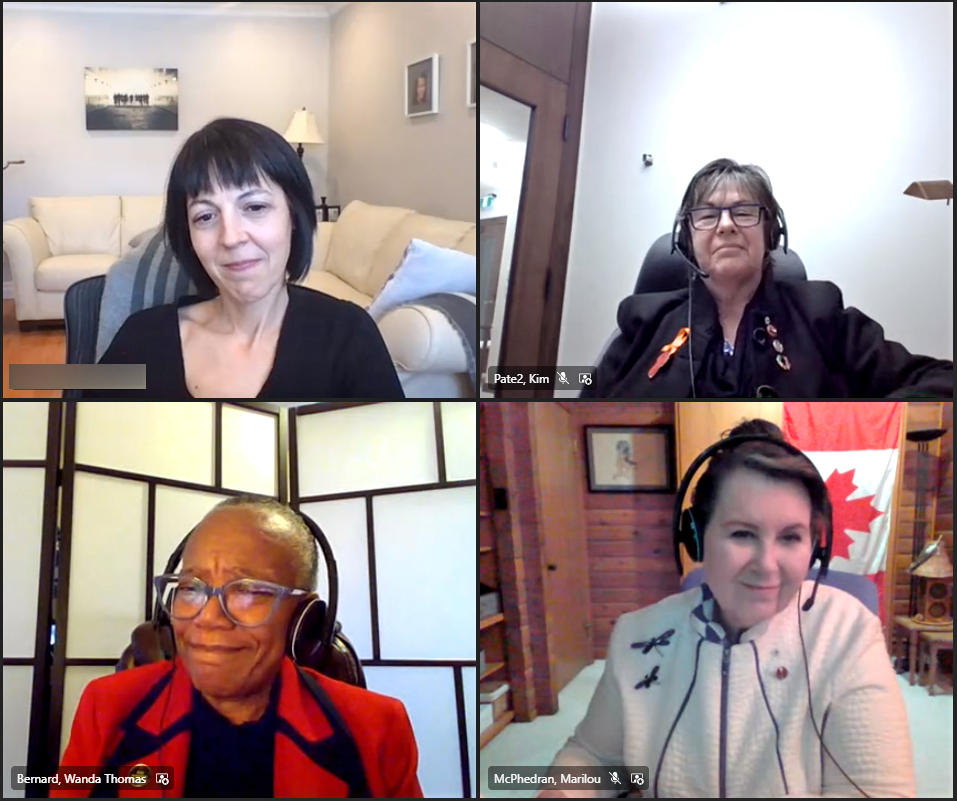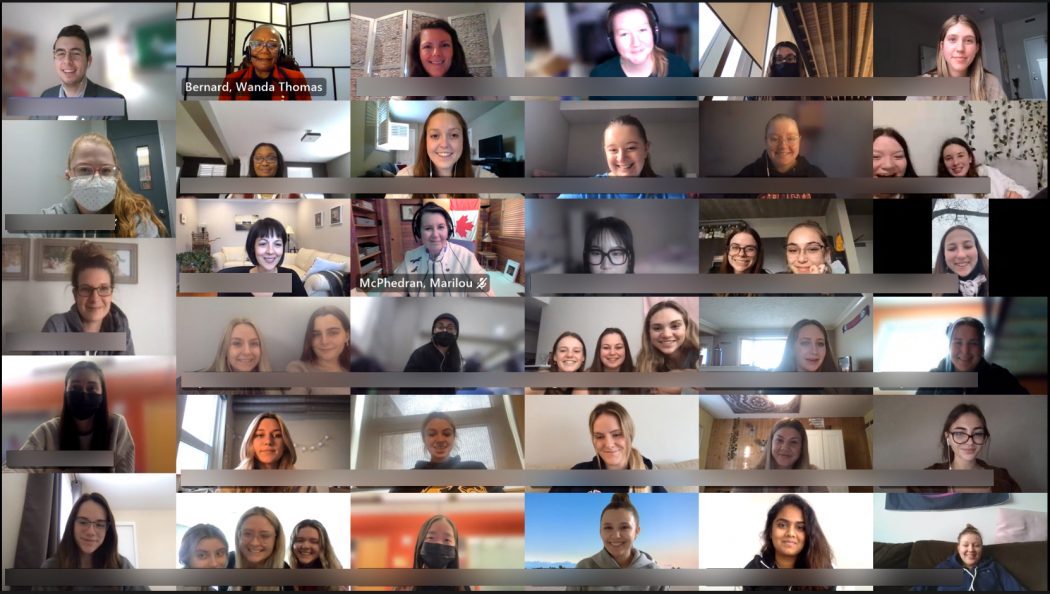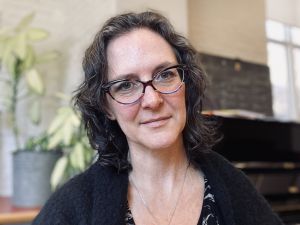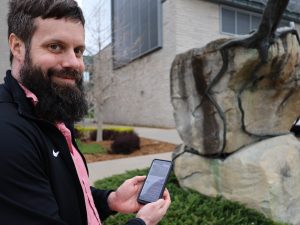 Clockwise from top left: Brock University Assistant Professor of Child and Youth Studies Heather Ramey moderates a discussion between students in her course and Senators Kim Pate, Marilou McPhedran and Wanda Thomas Bernard. (Photo courtesy of Senate of Canada)
Clockwise from top left: Brock University Assistant Professor of Child and Youth Studies Heather Ramey moderates a discussion between students in her course and Senators Kim Pate, Marilou McPhedran and Wanda Thomas Bernard. (Photo courtesy of Senate of Canada)Three Canadian senators recently brought their community engagement experience and expertise to a virtual Brock University classroom.
On Feb. 8, students in CHYS 2P16 — Principles of Community Engagement in Child and Youth Studies welcomed Sen. Wanda Thomas Bernard of Nova Scotia, who is also Deputy Chair of the Standing Senate Committee on Human Rights, along with Sen. Marilou McPhedran of Manitoba and Sen. Kim Pate of Ontario for an online discussion.
The senators were invited by Assistant Professor Heather Ramey, who teaches the full-year course in the Department of Child and Youth Studies and is also the Co-Director of Research at the Centre of Excellence for Youth Engagement.
Ramey made the connection to help illuminate the class’s current exploration of large systems and how interactions between communities and organizations can lead to impact that “filters up.”
“Senators have knowledge of big systems, and one of the eligibility requirements of being appointed to the Senate is a lengthy and recognized record of service to your community,” says Ramey. “So, I hoped they could speak to both the small and the big and how they interact, to see how community engagement matters in a bigger way, and vice versa.”

Three Canadian senators who advocate for community and human rights spoke with Brock students at a virtual event earlier this month. (Photo courtesy of Senate of Canada)
McPhedran, who co-founded the Women’s Legal Education and Action Fund, Metropolitan Action Committee on Violence Against Women and Children, and Gerstein Crisis Centre for homeless discharged psychiatric patients, enjoyed her exchange with the group of Brock learners.
“Through SENgage, the Senate’s youth outreach program, I have the opportunity to connect with young people from across Canada by visiting classrooms and meeting with the people behind various youth-serving organizations,” she says. “It was a privilege to speak with Brock students in Dr. Heather Ramey’s class about our work as senators and to hear about their own passions.”
Second-year Child and Youth Studies major Judith Kwofie says that after many discussions on how to engage youth and the larger systems at play, the visit helped demonstrate the practicality of community engagement.
“The senators are trying to get kids to write to them and then create volunteer opportunities or internships, motivating the youth by paying them or helping them earn credits in school,” says Kwofie. “They showed how even if youth feel intimidated coming to the system, the system should go to them and find them where they are so that everyone is included — not only youth who are already highly engaged, but everyone.”
Caitlyn Neufeld, a third-year Child and Youth Studies major, was inspired by the personal stories shared by the senators about “the power of community” and how it shaped their journeys.
“Hearing stories of how powerful members of the country participated in their own community engagement opens your eyes to see that there is no one way of doing it,” says Neufeld. “It can come in all shapes and sizes, but there are common themes throughout — beginning with a desire for change and feeling connected to a group, which then often leads to ongoing engagement.”
Steph Kravcik, a third-year Child and Youth Studies major with minors in Psychology and Women’s and Gender Studies, says hearing from the senators “lent an entirely new focus” to what she and her peers are learning in class.
“Listening to the senators, I heard themes of simple activities, low-cost and low-effort ways to contribute to the community, and that a single chat with someone in a governmental position can make all the difference,” she says.
This resonated with Kravcik, who had been inspired to share information on the Have a Heart Day initiative with members of parliament after learning about it from Ramey in class the week before meeting with the senators.
“I received responses back, and it was immediately apparent that I was being heard,” says Kravcik. “One of the MPs wrote directly back to me asking for more information so he could raise awareness, and I felt so proud.”
Ramey says the senators each spoke to how getting engaged at a young age can empower students to start their own journeys in engaging with community.
“Sen. Bernard, a founding member of the Association of Black Social Workers, talked about looking around and seeing need in order to make change,” says Ramey. “I think the students could see that they can look around, start sending emails, start taking small action right now and it could lead to very big change.”
Ramey also found the panel helped “solidify” many of the other issues that have been discussed over the course of the past year, including the power of the collective and the importance of building relationships and finding allies.
“I felt like the students got some key takeaways regarding what they can do, so that whether they become teachers or youth workers or whatever they decide to do, they now know some good strategies,” says Ramey. “Especially in a class like this, students want to understand but they also want some concrete, practical ideas for what they can do to make change, and I think that they got that.”
Ramey says she is grateful for the Senate of Canada’s SENgage program, which co-ordinated the panel, and for the participation of the three senators who spoke “so powerfully.” But above all, she was thrilled to see her students fully committing to the experience.
“The students had more questions than we could even get to,” she says. “We ran over time, because so many students wanted to participate.”









